Photo
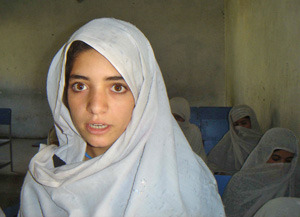
“In certain cafés close to medical colleges in Pakistan, and of course within the institutions themselves, students studying gynaecology speak of some unexpected sights they have seen.
‘Recently, we examined a woman who complained of pain in her genital region. We were shocked to see when we examined her that she had suffered some mutilation of her private parts. I have read about these practices but I didn’t know they took place here,’ Zeba Khan, a 4th year medical student, told IRIN.”
(read the rest at: IRIN Asia | PAKISTAN: Low awareness of hidden FGM/C practices | Pakistan | Gender Issues | Health & Nutrition | Human Rights)
15 notes
·
View notes
Link
“All sorts of torturers, dictators, fanatics, and demagogues struggling for power by way of a few loudly shouted slogans also enjoy their jobs, and they too perform their duties with inventive fervor. Well, yes, but they “know.” They know, and whatever they know is enough for them once and for all. They don’t want to find out about anything else, since that might diminish their arguments’ force. And any knowledge that doesn’t lead to new questions quickly dies out: it fails to maintain the temperature required for sustaining life. In the most extreme cases, cases well known from ancient and modern history, it even poses a lethal threat to society.”
6 notes
·
View notes
Link
Why This Is Important
Osmond Ugwu and Raphael Elobuike are Nigerian labour activists and human rights defenders currently spending their second month in Enugu Federal Prison in South East Nigeria. They are being detained on charges of attempted murder of a policeman following their arrest at a workers rally on 24th October 2011 at Enugu.
Osmond and Raphael, who Amnesty International regards as Prisoners of Conscience, have both been beaten and tortured during their arrest and while in police custody. Osmond has suffered considerable physical and psychological harassment and intimidation in the course of his human rights and labour activism. These include punitive transfer and eventual termination of his employment by the government; constant threat to his life, detention and imprisonment.
As the Chairman of the Enugu state chapter of the Civil Liberties Organisation (CLO), Osmond has consistently remained non violence in his human rights activism. As the leader of the Enugu State Workers Forum (EWF), Osmand mobilised workers for strikes, peaceful marches, demonstration and work boycott as a means of achieving their aims.
As fellow fighters for human rights in Nigeria, we are calling on the governor of Enugu State, Sullivan Chime, to immediately release Osmond Ugwu and Raphael Elobuike and drop all charges against them. Fearing the physical safety of Osmund, who is at risk of possible assasination attempts, we also seek government protection of him.
Read”>http://www.amnesty.org/en/library/asset/AFR44/002/2012/en/e85762bc-7251-4e4d-968d-3141ad5cd391/afr440022012en.html”>Read Amnesty International’s public statement
4 notes
·
View notes
Photo
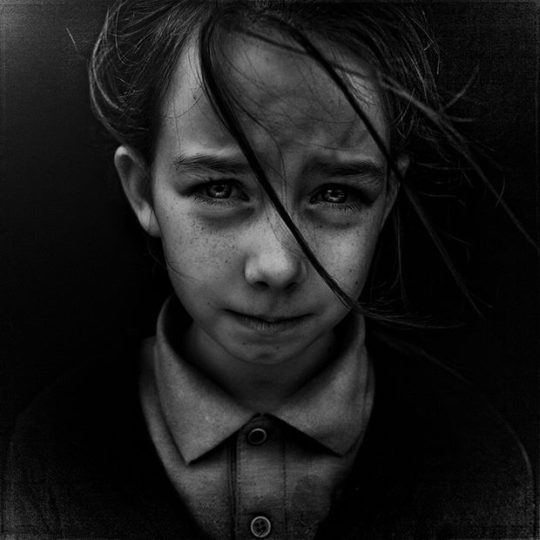


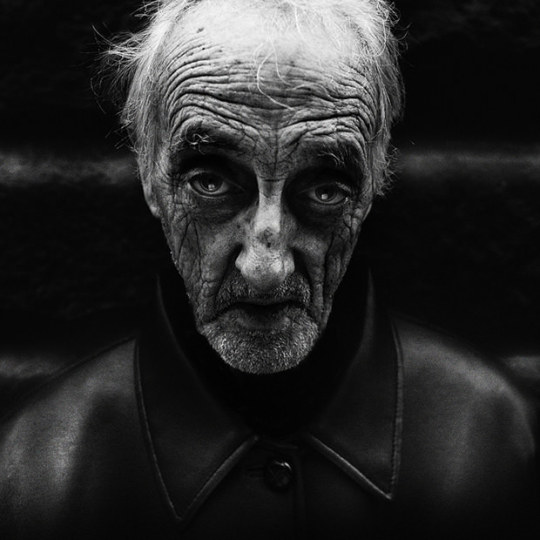

Photographer Lee Jeffries worked as a sports photographer before having a chance encounter one day with a young homeless girl on a London street. After stealthily photographing the girl huddled in her sleeping bag, Jeffries decided to approach and talk with her rather than disappear with the photograph. That day changed his perception about the homeless, and he then decided to make them the subject of his photography. Jeffries makes portraits of homeless people he meets in Europe and in the US, and makes it a point to get to know them before asking to create the portraits. His photographs are gritty, honest, and haunting.
13K notes
·
View notes
Text
Killed because they were girls - Christie Blatchford for the National Post
EXCERPT:
Looking directly at Shafia, 58, Yahya, 42, and their oldest son Hamed as they stood before him in the prisoners' box for the last time, the judge concluded with a stinging denunciation.
"The apparent reason behind these cold-blooded, shameless murders was that the four completely innocent victims offended your twisted notion of honour, a notion of honour that is founded upon the domination and control of women, a sick notion of honour that has absolutely no place in any civilized society."
Read the full article.
Additional:
Were Shafia murders 'honour killings' or domestic violence? - Toronto Star
10 notes
·
View notes
Photo
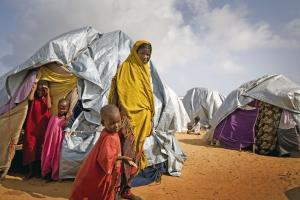
IRIN Africa | SOMALIA: Rape on the rise amid “climate of fear” in Mogadishu IDP camps
From IRIN:
“The number of reported rapes in camps for internally displaced people (IDPs) in Mogadishu, the Somali capital, has risen sharply, creating ‘a climate of fear,’ according to a civil society source.
‘We have had the problem of rape in the city but what we are witnessing now is on a scale never seen before,’ said Mama Hawo Haji, a women’s rights activist. ‘For instance, in the last two days alone, we have taken 32 rape cases to the hospital; in the past four months we recorded 80 cases.’”
For more, see: Somalia | Conflict | Gender Issues | Governance)
49 notes
·
View notes
Link
(Washington, D.C.) — A bill passed by the French senate (January 23rd) would violate freedom of expression by making it a criminal offense to publicly question events termed as “genocide” under French law, Amnesty International said today.
In 2001, a French law officially declared that the mass...
10 notes
·
View notes
Photo
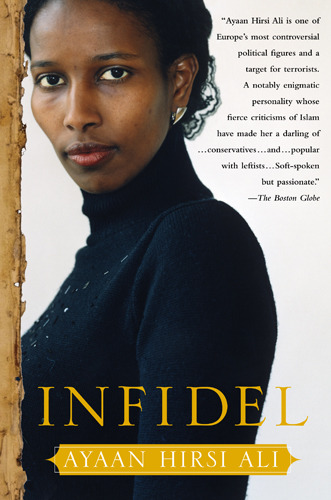
In his foreword Christopher Hitchens writes, "She is much wiser than many thousands of apologetic academics and pundits, and she is also, I want to say, much more tolerant and much more humane. It is impossible to imagine her disliking someone on the mere grounds of origin or faith, just as it is impossible to imagine her being reconciled to any dogma that forms its calcified opinion on that basis."
BACKCOVER:
"Infidel shows the coming of age of this distinguished political superstar and champion of free speech as well as the development of her beliefs, iron will, and extraordinary determination to fight injustice. Raised in a strict Muslim family, Hirsi Ali survived civil war, female mutilation, brutal beatings, adolescence as a devout believer during the rise of the Muslim Brotherhood, and life in a four troubled, unstable countries ruled largely by despots. She escaped from a forced marriage and sought asylum in the Netherlands, where she earned a college degree in political science, tried to help her tragically depressed sister adjust to the West, and fought for the rights of Muslim women and the reform of Islam as a member of Parliament. Under constant threat, demonized by reactionary revolutionary Islamists and politicians, disowned by her father, and expelled from family and clan, she refuses to be silent.
"Ultimately a celebration of triumph over adversity, Hirsi Ali's story tells how a bright little girl evolves out of dutiful obedience to become an outspoken, pioneering freedom fighter. As Western governments struggle to balance democratic ideals with religious pressures, no other book could be more timely or more significant."
With Reverence,
C.
15 notes
·
View notes
Photo
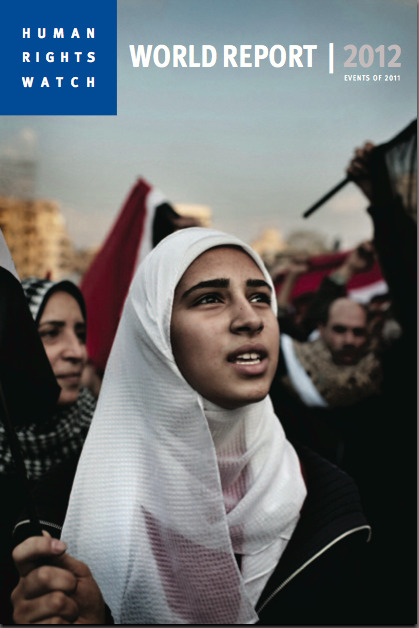
Morning Reading. Human Rights Watch has released its annual World Report. Check out the essays, which cover the revolutions in the Middle East and North Africa, the Soviet bloc twenty years on, human rights and tolerance in Europe, and rights for the disabled, among others. Also check out the individual country chapters.
The report is accompanied by photosets, a video and some extra resources on human rights in the Arab World, to support the report’s special focus on the anti-regime uprisings.
[Download here; View the main page]
233 notes
·
View notes
Photo
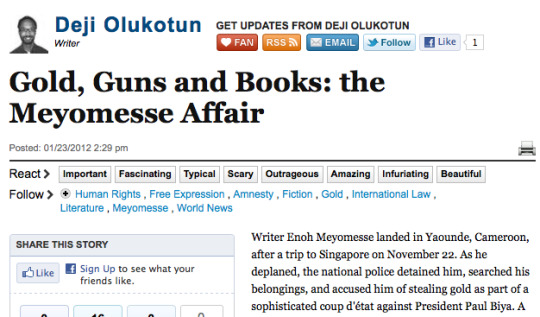
My article in the Huffington Post on detained writer in Cameroon Enoh Meyomesse—and how you can do something about it.
1 note
·
View note
Photo

Gambia: AI demands release of jailed ex minister
“These men are prisoners of conscience and must be released immediately and unconditionally. Gambia must stop such acts of persecution and allow criticism to be heard in the country,” said Lucy Freeman AI researcher on the Gambia in a press release.
Amnesty International has urged the international community to publicly condemn human rights violations in the Gambia, such as arbitrary arrests, torture, extrajudicial executions and enforced disappearances.
According to Lucy Freeman, Amnesty International’s researcher on the Gambia; “The conviction of these men is a violation of their rights to freedom of expression, assembly and association.”Amnesty International today called for the immediate release of four activists arrested over the distribution of T-shirts calling for an end to dictatorship in the Gambia.
The four were arrested in June 2011 after distributing T-shirts made by the NGO “Coalition for Change – The Gambia” (CCG), which featured the slogan “End to Dictatorship Now”.
13 notes
·
View notes
Text
Dictionary of Human Rights
Dictionary of Human Rights
Over 200 clear and concise mini-essays providing explanations of the terminology, issues, organizations and laws surrounding human rights. Take Action! Get it immediately!!
5 notes
·
View notes
Photo
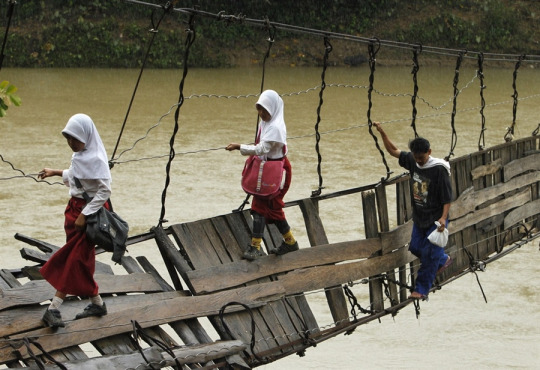
For Sofiah and her classmates, the journey to school just got a whole lot harder. The Indonesian schoolgirl lives on one side of the Ciberang River but her school in the village of Sanghiang Tanjung is on the other - and the river has been flooding.
On Monday, the rising waters broke a pillar supporting a suspension bridge that crosses it, the head of the village told Reuters.
Faced with an extra 30 minutes’ walk to cross via an alternate bridge, Sofiah and her friends have chosen to undertake the precarious crossing of the collapsed bridge instead.
1K notes
·
View notes
Photo
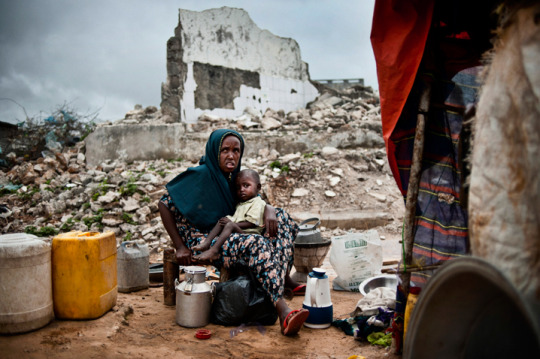
This mother and child—and this part of Mogadishu—show the toll of the overlapping political, security, and public health crises in Somalia, which have put an immense burden on women and children.
Years marked by conflict, drought, and a profound lack of governance culminated in a massive humanitarian crisis in the second half of 2011, to which MSF responded by expanding its programs in Somalia and for the huge numbers of Somali refugees who sought aid in Kenya and Ethiopia.
Photo: Somalia © Lynsey Addario/VII
175 notes
·
View notes
Video
youtube
Life In North Korea
Here is a video about the real status of life in North Korea, brought to us by LiNK (Liberty in North Korea).
Hope that people who have seen this short video can pass it on to their audience for more people can be aware.
2 notes
·
View notes
Link
A recent United Nations Human Rights Council report examined the important question of whether internet access is a human right.
While the Special Rapporteur’s conclusions are nuanced in respect of blocking sites or providing limited access, he is clear that restricting access completely will always be a breach of article 19 of the International Covenant on Civil and Political Rights, the right to freedom of expression.
But not everyone agrees with the UN’s conclusion. Vint Cerf, a so-called “father of the internet” and a vice-president at Google, argued in a New York Times editorial that internet access is not a human right:
The best way to characterise human rights is to identify the outcomes that we are trying to ensure. These include critical freedoms like freedom of speech and freedom of access to information — and those are not necessarily bound to any particular technology at any particular time. Indeed, even the United Nations report, which was widely hailed as declaring internet access a human right, acknowledged that the internet was valuable as a means to an end, not as an end in itself.
Cerf does concede that internet access may be a civil right, defined as a right which is “conferred upon us by law” (arguably a definition which does not apply to the UK where the European Convention on Human Rights has been incorporated into our law). He says:
While the US has never decreed that everyone has a “right” to a telephone, we have come close to this with the notion of “universal service” — the idea that telephone service (and electricity, and now broadband internet) must be available even in the most remote regions of the country. When we accept this idea, we are edging into the idea of internet access as a civil right, because ensuring access is a policy made by the government.
There have been some interesting responses to Cerf’s op-ed. Amnesty International’s USA blog argues that he provides an “exceptionally narrow portrayal of human rights from a legal and philosophical perspective”. Moreover, his means versus ends characterisation of rights is philosophically incoherent, for:
while access to the physical town square may not be a human right in isolation, it has always been for most inseparable from the right to association and expression
So, applying the same logic, internet access is inseparable from freedom of expression and its lesser spotted cousin, freedom of access to information. Moreover, I would argue that internet use may also fall within Article 8 ECHR, the right to family and private life, as email, Skype, Facebook and Twitter are now essential tools of interaction between friends and family.
From the technological standpoint, JD Rucker on the Techi Blog argues that outcomes are key, and elevating the internet to the status of an inalienable right will result in “increased opportunity, improved education, and the end of hostilities based upon ignorance”.
Matthew Ingram on Gigaom also makes the practical point that not defining internet access as a human or civil right “makes it easier for governments to place restrictions on access or even shut it down entirely”. This is particularly relevant given the widely-cited role of the internet and specifically social media in recent political revolutions like the Arab Spring.
Of course, this is not just a philosophical debate. States already ban internet use in one form or another regularly. Closer to home, there are already a number of laws which allow state authorities to restrict internet access, most notably rules relating to sex offenders and terrorist suspects. The troubled Digital Economy Act has been attacked over proposed powers to ban websites which host copyright material without permission. The government subsequently backed down over the issue, but the Act remains controversial.
Interestingly, the UK Court of Appeal has agreed with the sentiment of the UN report, although without expressing its conclusion in terms of human rights. The recent case of Regina v Smith & others (read Maria Roche’s post here) involved an examination of the terms of a Sexual Offences Prevention Order under the Sexual Offences Act 2003.
The court ruled that the internet was an “essential part of everyday living” and therefore, a complete ban on use in this case would be disproportionate. This was expressed very wide terms, and it is difficult to imagine many scenarios where a complete ban would be permitted by law.Lord Justice Hughes said:
Before the creation of the internet, if a defendant kept books of pictures of child pornography it would not have occurred to anyone to ban him from possession of all printed material. The internet is a modern equivalent.
However, full internet bans have occasionally been permitted by the courts. Mr Justice Silber ruled in the November 2011 case of AM v Secretary of State for the Home Department (see Rosalind English’s post) that a full internet ban placed upon a terrorist suspect subject to a control order (a highly restrictive anti-terrorism power) was lawful. It should be noted that the successor to control orders, the TPIM, no longer permits complete internet bans.
Interestingly, in AM the judge accepted the security services’ evidence that it would be practically impossible to monitor the suspect’s internet use, due in part to vulnerabilities in the Windows operating system. This sounds highly debatable, but perhaps that technical argument will be had on another day.
Ultimately, it seems that the current position in UK law - reflecting but not wholly endorsing the UN report - is that internet access will remain, reflecting freedom of expression under Article 10 ECHR, a qualified right. That is, it can be restricted but only if that restriction is provided for by law and necessary/proportionate in a democratic society, unlike for example the absolute restriction on inhuman and degrading treatment under Article 3 ECHR.
Indeed, the UN Report accepts that in some scenarios internet access will need to be restricted, for example in the case of sex offenders and terrorist suspects – which is also the conclusion of this excellent 2011 post on Inforrm’s blog.
This is a question which will certainly be revisited in the coming years. Whether the UN or Vint Cerf is right on a philosophical level as to whether internet access should be characterised as a human right, technology is changing rapidly and the courts will have to do their best to keep up. Whether or not it is a human right in its own respect, the internet provides the gateway to other freedoms, notably freedom of expression and the right to family and private life and therefore access to can be, practically, inseparable from the rights themselves.
It is highly unlikely that internet access will ever attain the status of an absolute right. However, the current position of UK courts rightly makes it very difficult indeed for the state to ban completely a citizen’s use of the internet, however strong the justification.
| Adam Wagner | Law | guardian.co.uk
16 notes
·
View notes
